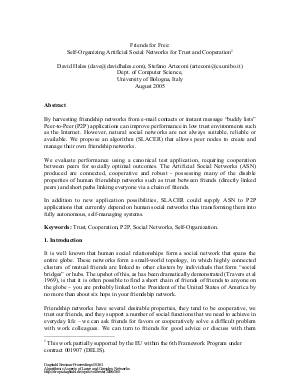Friends for Free: Self-Organizing Artificial Social Networks for Trust and Cooperation
Authors David Hales, Stefano Arteconi
-
Part of:
Volume:
Dagstuhl Seminar Proceedings, Volume 5361
Part of: Series: Dagstuhl Seminar Proceedings (DagSemProc) - License:
 Creative Commons Attribution 4.0 International license
Creative Commons Attribution 4.0 International license
- Publication Date: 2006-05-08
File

PDF
DagSemProc.05361.8.pdf
- Filesize: 362 kB
- 20 pages
Document Identifiers
Subject Classification
Keywords
- Evolution of cooperation
- Evolving Networks
- P2P
- Prisoner's Dilemma
- Tags
Metrics
- Access Statistics
-
Total Accesses (updated on a weekly basis)
0Document
0Metadata
Abstract
By harvesting friendship networks from e-mail contacts or instant message "buddy lists" Peer-to-Peer (P2P) applications can improve performance in low trust environments such as the Internet. However, natural social networks are not always suitable, reliable or available. We propose an algorithm (SLACER) that allows peer nodes to create and manage their own friendship networks. We evaluate performance using a canonical test application, requiring cooperation between peers for socially optimal outcomes. The Artificial Social Networks (ASN) produced are connected, cooperative and robust - possessing many of the disable properties of human friendship networks such as trust between friends (directly linked peers) and short paths linking everyone via a chain of friends. In addition to new application possibilities, SLACER could supply ASN to P2P applications that currently depend on human social networks thus transforming them into fully autonomous, self-managing systems.
Cite As Get BibTex
David Hales and Stefano Arteconi. Friends for Free: Self-Organizing Artificial Social Networks for Trust and Cooperation. In Algorithmic Aspects of Large and Complex Networks. Dagstuhl Seminar Proceedings, Volume 5361, pp. 1-20, Schloss Dagstuhl – Leibniz-Zentrum für Informatik (2006)
https://doi.org/10.4230/DagSemProc.05361.8
BibTex
@InProceedings{hales_et_al:DagSemProc.05361.8,
author = {Hales, David and Arteconi, Stefano},
title = {{Friends for Free: Self-Organizing Artificial Social Networks for Trust and Cooperation}},
booktitle = {Algorithmic Aspects of Large and Complex Networks},
pages = {1--20},
series = {Dagstuhl Seminar Proceedings (DagSemProc)},
ISSN = {1862-4405},
year = {2006},
volume = {5361},
editor = {Stefano Leonardi and Friedhelm Meyer auf der Heide and Dorothea Wagner},
publisher = {Schloss Dagstuhl -- Leibniz-Zentrum f{\"u}r Informatik},
address = {Dagstuhl, Germany},
URL = {https://drops.dagstuhl.de/entities/document/10.4230/DagSemProc.05361.8},
URN = {urn:nbn:de:0030-drops-5659},
doi = {10.4230/DagSemProc.05361.8},
annote = {Keywords: Evolution of cooperation, Evolving Networks, P2P, Prisoner's Dilemma, Tags}
}
